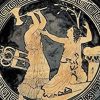The chorus repeat their threats and insist that they have been insulted by the Athenians. Athene pleads with them to reconsider. She tells them to be reasonable, to accept the will of Zeus and the honors offered them by Athens.
The Furies lament the unjust treatment they have received. They say their ancient rights have been taken away. Athene replies that she will tolerate their anger because they are older and wiser than she is. Still, she has wisdom also, and her advice to accept the loving offer of a home in Athens is wise. She says, “Do good. Receive good, and be honored as the good / are honored. Share our country, the beloved of god.”
Athene repeats this offer and promises even more benefits until the Furies begin to calm down. Her offer has aroused their interest. They begin to listen carefully and ask eager questions. There is great attraction to them in her promise of a place of perpetual honor and utility in Athens. Finally they accept. They begin to pronounce blessings on the land instead of the curses they had threatened earlier.
Athene and the Furies join together in a responsive lyrical description of the brilliant future that awaits Athens now that “holy persuasion” has replaced violence. The Furies are renamed the Eumenides, or “kindly ones,” in recognition of their new character, for they are now benevolent spirits instead of personifications of vengeance and misfortune.
Meanwhile, the women and girls of Athens have assembled with lighted torches to welcome the Eumenides. They form up together in ranks and escort the chorus from the stage in a great parade that is meant to represent the Pan-Athenaic Procession. As they march out, all the participants join together in a hymn that concludes,
There shall be peace forever between these people
of Pallas [Athene] and their guests. Zeus the all seeing
met with Destiny to confirm it.
Singing all follow our footsteps.
The play ends.
Analysis
The Eumenides ends on an exalted note of reconciliation and optimism. Orestes and his family have no part in the closing scene of the play. Their absence at the moment of resolution and the knowledge that the trial of Orestes was conducted on extraneous grounds and really solved nothing indicate that their role in the trilogy is symbolic. Aeschylus used the story of the family of Atreus to provide illustrative material for his analysis of the central issue of the trilogy — the nature of justice.
At the conclusion of the trilogy, the Furies, who were originally the uncompromising agents of destiny and divine retribution, are mystically converted into benevolent spirits although their insistence that authority and discipline are essential components of society is heeded. A new social and moral dispensation is established by Zeus through his daughter Athene, the personification of wisdom. Justice will now be secured by an impartial and rational human court. The new justice will be tempered by mercy and understanding, as in the trial of Orestes. The sacred institutions of Athens are glorified as the pattern of earthly justice and happiness. “Holy persuasion,” reason, is the civilizing instrument of the new order.
The closing pageant binds together all elements of the new harmony — primitive and modern, divine and human — and the brilliant pageant, an imitation of Athens’ most holy festival, symbolizes the fulfillment of man’s long and painful groping toward a satisfactory organization of society. Humanity at last is liberated from the prison of ignorance, fear, and hatred.

